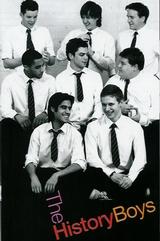The History Boys
What a wonderfully warm and at times hilariously funny comic drama Alan Bennett has authored in his new play "The History Boys". His subject is that theme so beloved of Thatcherism and New Labour, "Education, Education, Education" as Tony Blair annunciate in Labour's 1997 election pledge.
The story concerns a group of teenage boys who are being prepared for their Oxbridge entrance exam. The headmaster is obsessed with school league-table results, and wants his boys to go to Oxford. To that end he employs Oxford graduate Irwin to teach the boys how to succeed in their history exam.
However, not all the teachers share the headmaster's functional approach to education. The ponderous and cordially eccentric teacher of 'General Studies' Hector, is far more interested in feeding the boys souls rather than filling them with empty facts. "Exams are the enemies of education" Hector proclaims, and he tells the boys that their A-level results are their "emblems of conformity".
What takes place is a clash of values between a functional, pragmatic approach to education and a more liberal romantic idealism. Irwin teaches a journalistic approach to passing exams: catchy headlines, pithy quotes and a subversion of the expected dull answer. Passing exams, according to Irwin, is all about being noticed. Hector teachers Larkin, Auden, Coward and just in case the boys become too earnest in their studies he also teaches them songs by George Formby and Gracie Fields!
The boys' love Hector and enjoy joining his conspiracy against all that is mediocre. Behind the safety of his locked classroom door they are allowed to act out scenes from old movies, such as Brief Encounter, or Seventh Veil, and serenade each other with renditions of "Bye Bye Black Bird". The headmaster however despises Hector, not because he doubts his ability to teach, but because it is impossible to measure or quantify his results. He bemoans the fact that the boys in Hector's class know all the words to "When I'm Cleaning Windows".
The headmaster is therefore delighted to discover that Hector has been molesting the boys who he offers lifts home on his motorbike. Here is the headmaster's perfect opportunity to dismiss Hector. Hector cannot see the harm in the special 'Benediction' that he offers to his boys. After all the boys do not object and are happy to take turns on the back of Hector's bike. In deed some of the boys are jealous that Hector obviously does not think them interesting enough to warrant his attention.
There are superb performances from the whole of the cast. However it is Richard Griffiths who shines as the jovial, unconventional Hector. Amongst the boys he appears as a rotund Peter Pan, playing games with his gang of lost boys whom he seeks to protect from the officious adult world of efficiency, where everything has to be counted, measured and quantified. Griffiths incarnates Hector's romantic idealism as he lovingly explains to one of the boys how literature is able to offer comfort in moments of melancholy; his large frame melts away to reveal the tender spirit it covers. Hector's tears, when it looks as if is career is about come to a grubby end, are heart wrenching, and make you want to reach out and comfort this kind, if somewhat foolish, man.
Stephen Campbell Moore's Irwin looks every inch the 'meretricious' naive young man that Hector believes him to be. However, even he is influenced by Hector and the boys that he instructs, he discovers that the secret of being a good teacher is friendship. Later, when Irwin is a politician he declares with all the meretricious earnestness that we have come to expect of government ministers, "I am in government, not politics", and goes on to explain that "the loss of liberty is the price we pay for freedom."
Frances de la Tour has only a supporting role as Mrs Lintott, a female history teacher, yet Bennett has provided her character with some memorable lines that have the audience rolling with laughter. When the discussion moves to the question 'What is history?' she replies "masculine ineptitude" and goes on to thunder in an imperious voice "History is women following behind, with a bucket."
One would think that performing with such experience actors as Richard Griffiths and Frances de la Tour would intimidate the troop of young actors who play the boys, but far from it. Director Nicholas Hytner has enabled each boy to shine with heartfelt vigour. Especially worthy of mention is Dominic Cooper who plays Dakin, the handsome young boy who awakens so much sexual passion in others, and Samuel Barnett as Posner, the student who has falling hopelessly in love with Dakin.
This is a loving heartfelt comedy that enchants as it entertains.
What other critics had to say.....
PAUL TAYLOR for THE INDEPENDENT says, "The play is a delight." MICHAEL BILLINGTON for THE GUARDIAN says,"A superb, life-enhancing play." "NICHOLAS DE JONGH for THE EVENING STANDARD says, "Comic ramble fails to make the top grade." CHARLES SPENCER for THE DAILY TELEGRAPH says, "This is a wonderful evening, as heart-catching as it is hilarious." BENEDICT NIGHTINGALE for THE TIMES says, "Curious, questing, intelligent, witty and, at times, hilarious." ALASTAIR MACAULAY for THE FINANCIAL TIMES says, "Brilliantly funny, with lines that we will, I hope, quote for years and several show-stopping vignettes."
External links to full reviews from popular press
The Independent
The Guardian
Daily Telegraph
Financial Times
The Times
Originally published on
